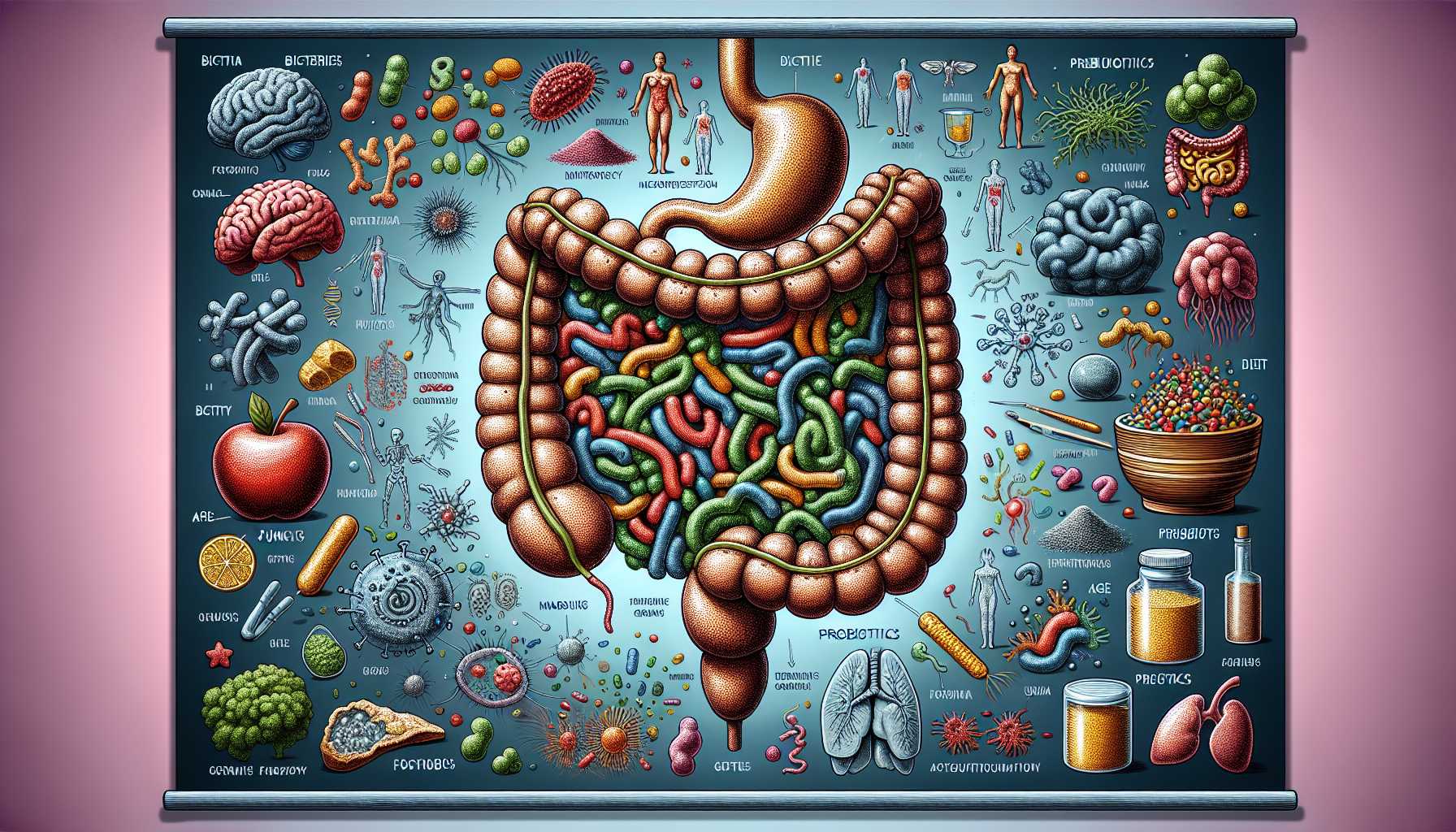
The gut microbiome refers to the trillions of microorganisms, including bacteria, viruses, fungi, and other microbes, that inhabit the gastrointestinal tract.
Chōnai maikurobaioomu wa, chōkan ni seikatsu suru saikin, uirusu, shinkin, sonota no biseibutsu o fukumu sūchō no biseibutsu o shimeshimasu.
腸内マイクロバイオームは、腸管に生息する細菌、ウイルス、真菌、その他の微生物を含む数兆の微生物を指します。
These microbes play a crucial role in digestion, nutrient absorption, and overall health by influencing metabolism, immune function, and even mental health.
Korera no biseibutsu wa, taisha, men'eki kinō, sarani wa mentaru herusu ni eikyō o ataeru koto ni yori, shōka, eiyō kyūshū, zentaiteki na kenkō ni oite jūyōna yakuwari o hatashimasu.
これらの微生物は、代謝、免疫機能、さらにはメンタルヘルスに影響を与えることにより、消化、栄養吸収、全体的な健康において重要な役割を果たします。
The composition of the gut microbiome varies among individuals and can be affected by factors such as diet, age, genetics, lifestyle, and the use of antibiotics.
Chōnai maikurobaioomu no kōsei wa kojin ni yotte kotonari, shokuji, nenrei, iden, raifusutairu, kōseibusshitsu no shiyō nado no yōin ni yotte eikyō o ukeru kanōsei ga arimasu.
腸内マイクロバイオームの構成は個人によって異なり、食事、年齢、遺伝、ライフスタイル、抗生物質の使用などの要因によって影響を受ける可能性があります。
A diverse and balanced gut microbiome is essential for maintaining good health, while an imbalance, known as dysbiosis, can lead to various health issues, including gastrointestinal disorders, obesity, and autoimmune diseases.
Tayō de baransu no toreta chōnai maikurobaioomu wa ryōkō na kenkō o iji suru tame ni fukaketsu de ari, ippō, disubaio-shi to shite shirareru fukinkō wa, shōkaki shikkan, himan, jikomen'eki shikkan nado no samazama na kenkō mondai o hikiokosu kanōsei ga arimasu.
多様でバランスの取れた腸内マイクロバイオームは良好な健康を維持するために不可欠であり、一方、ディスバイオシスとして知られる不均衡は、消化器疾患、肥満、自己免疫疾患などのさまざまな健康問題を引き起こす可能性があります。
Research suggests that a diet rich in fiber, fruits, vegetables, and fermented foods can promote a healthy microbiome.
Kenkyū ni yoru to, shokumotsu sen'i, kudamono, yasai, hakko shokuhin ga hōfu na shokuji wa, kenkō-teki na maikurobaioomu o sokushin dekiru to sareteimasu.
研究によると、食物繊維、果物、野菜、発酵食品が豊富な食事は、健康的なマイクロバイオームを促進できるとされています。
Probiotics and prebiotics are also highlighted as beneficial for gut health, as they help support the growth of beneficial bacteria.
Purobaiotikusu to purebaiotikusu mo, zendama-kin no seichō o shien suru tame, chō no kenkō ni yūeki de aru to kyōchō sareteimasu.
プロバイオティクスとプレバイオティクスも、善玉菌の成長を支援するため、腸の健康に有益であると強調されています。
Recent studies are exploring the connection between the gut microbiome and other bodily systems, including the brain, indicating that gut health could influence mental health conditions such as anxiety and depression.
Saikin no kenkyū de wa, chōnai maikurobaioomu to nō o fukumu hoka no karada no shisutemu tono kankei ga tankyū sareteori, chō no kenkō ga fuan ya utsubyō nado no mentaru herusu jōtai ni eikyō o ataeru kanōsei ga shisa sareteimasu.
最近の研究では、腸内マイクロバイオームと脳を含む他の体のシステムとの関係が探求されており、腸の健康が不安やうつ病などのメンタルヘルス状態に影響を与える可能性が示唆されています。
The understanding of the gut microbiome's importance has led to increased interest in personalized nutrition and therapies aimed at restoring microbial balance to improve overall health.
Chōnai maikurobaioomu no jūyō-sei no rikai wa, pāsonaraizu sareta eiyō to biseibutsu no baransu o kaifuku suru koto o mezashita chiryōhō e no kanshin no takamari ni tsunagatteimasu.
腸内マイクロバイオームの重要性の理解は、パーソナライズされた栄養と微生物のバランスを回復することを目指した治療法への関心の高まりにつながっています。
Based on this article
